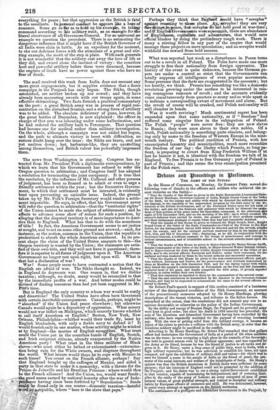The news from Washington is startling. Congress has ex- tracted
from Mr. President Polk a diplomatic correspondence, by which we learn that his Government has refused to refer the Oregon question to arbitration ; and Congress itself has adopted a resolution for terminating the joint occupancy. It is true that the resolution, by the influence of Mr. Calhoun and other persons of judgment, has been so framed as to admit or even to urge a friendly settlement within the year ; but the Executive Govern- ment, to which that settlement must be intrusted, is evidently bent upon preventing an amicable issue. Indeed, the ground taken up by Mr. Polk's Foreign Secretary would render a settle- ment impossible. He says, in effect, that his Government never will refer the question to arbitration—that the "territorial rights" of the Union cannot be made the subject of arbitrement ; and he affects to advance some show of reason for such a position, by alleging that the disputed territory is of more importance to Ame- rica than to England. What has that to do with the soundness Of title I' In fact, the American Government seems to set justice at nought, and to act on some other ground not avowed,—such, for instance, as the notion, common in the Union, that the republic is predestined to absorb the whole American continent. In its pre- sent shape the claim of the United States amounts to this—the Oregon territory is wanted by the Union ; the claimants are satis- fied of their own title, and they will not have it questioned; there- fore it is superior to all forms of judgment upon it. The American Government no longer rest upon right, but upon will. What is that but a declaration of war War Some people seem to have contracted a notion that the English are afraid of war. The Sikhs thought so. Indeed, we in England do deprecate war. One reason is, that we dislike taxation ; although, no doubt, many would be reconciled to that by the immediate profits of a war. And better modes could be devised of finding resources than had yet been suggested in Mr. Pitt's time.
But is England the only country to whom war would be costly and disastrous? The United States have often been threatened with certain inevitable consequences. Canada, perhaps, might be " absorbed" if the Union had peace elsewhere ; but otherwise Canada would again be a depository of aggression. What misery would not war inflict on Michigan, which scarcely knows whether to call itself American or English? Boston, New York, New Orleans, Philadelphia—whither would their ;rade fly, beset by English blockaders, with only a feeble navy to defend it? It would flourish only in one marine whose activity might be winked at by England—the marine of English smugglers. What trust could the Union put in the countless bands of English, Scotch, and Irish emigrant citizens, already exasperated by the Native American party ? What trust in the three millions of Black slaves—who must either be bribed or exterminated—extermina- tion being ruin for the White owners, and disgrace throughout the world. What leisure would the,re be to cope with Mexico in such times? You count on the French alliance, perhaps ? Say that England bought up the suffrages of Mexico, and aided a party in that state to make it a monarchy, with a throne for the Prince de Joinville and his Brazilian Princess : where would then be the French alliance? And the Union, too, would want funds ; thesood name earned by national honesty after the war of Inde- pendence having since been forfeited by " Repudiation ": funds could he found only in one source—domestic taxation—hateful word in a.republic, where "base is the slave that pays." Perhaps they think that Engler& mould have " scruples" st reaasting to ilsee plans. Ay, orruples ! they are very gain ace, but !scruples do not hold good in war-time ; andfif EnglishOovernruents were sqneamish, there are abundance of Vngli.m, capitalists and adventurers, that would save official blushes by doing the preliminary rough work. There is many a stirring fellow in any part of the empire that would manage these projects on mere speculation; and no scruples would withhold due reward from bold success.


























 Previous page
Previous page